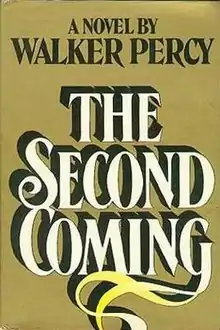The Second Coming (Percy novel)
The Second Coming is a novel by Walker Percy. It is a sequel to The Last Gentleman. It tells the story of middle-aged Will Barrett and his relationship with Allison, a young woman who has escaped from a mental hospital. The book was nominated for the National Book Critics Circle Award in 1980.[1]

(Farrar, Straus & Giroux)
The novel spends much of its content in unspoken but printed dialog of Will Barrett (the principal character) with himself and/or people he has dealt with in his past. He talks his way through his memories and realizes he is a character who suffers from the affliction that his father had: the belief that life – as most people (including him) live it – is worse than death. His father's solution was to kill himself (as did Percy's own father and grandfather), but his father also opted to try to kill him (Will), in order to save him from the life of despair that his father knows will befall him. He reflects on these occurrences throughout the book.
Barrett decides he will put God to the test. He will enter a cave near his home in North Carolina, telling no one what he is doing but leaving notes in case he does not return, and take barbiturates until God proves His existence and love by saving him, or he dies, thus demonstrating God does not exist. After a literal dark night of the soul at the end of which he is brought out of his drugged stupor by shooting pain from an abscessed tooth, he is figuratively reborn, falling out of the cavern and into the care of a woman who is a refugee from an insane asylum. Whereas he cannot escape the past, she can only live in the present, bereft of memory by prior electroshock therapy. Two maimed and incomplete people come together and somehow make each other whole, and Will Barrett is, however briefly, redeemed through love of and with another. The book represents a remarkable depiction of the human struggle with faith.
This work contains Percy's musings on "ravening particles," a reference to the alienation and anomie the individual feels from both within and without in the absence of faith.
Full summary
The reader is introduced to a man who is having an issue. He is depressed leading up to two significant events. One, he falls down in a bunker on a golf course for no particular reason. The second happens while he hits a ball out of bounds (way off course, if you are not into golf). Then we jump, for the remainder of the section, to another incident on a golf course. I cannot tell if this is the same round from when he fell in the bunker or not. It is definitely not the one where he hit the ball out of bounds. He hits a great second shot on a par 5 and after the shot, goes into a trance or hallucination of a memory from high school. It involves a girl who was valedictorian in his class while he was salutatorian. It seems as though it is a memory of a time when he could have talked to her, or talked to her more, but did not. They were never in a relationship, and there is regret, or at least the thought that if they had, they would have been a great couple—or maybe not. He comes out of the trance and the doctor friend he is golfing with is concerned. They finish the round with questions about what it means that all the Jews have left, or are leaving, North Carolina.
After a morning golf game he drives out of town through a town of many churches. He pulls over on the side of the road. He pulls out a gun and fires it into a gorge. This usually helps to clear the spells from his head; it does not seem to work as well this time. He puts the barrel to his head and thinks this would stop the spells, but then he would not find out what is going on. We find out his name is Will Barrett; he is very rich and successful. His wife died six months earlier. He sits in his five-car garage, inside his Mercedes, and contemplates a cat. A cat is always 100% a cat. He thinks humans are never 100% themselves. He comes to decide that he is only 2% of himself and wonders how to get the other 98%. He walks across the floor and is awoken by a bullet hitting the floor next to him. It is their gardener/poacher hunting who accidentally fired a shot into the garage. This leads to reflecting on why he only feels more like himself when he is getting shot at. "Peace is only better than war if peace is not hell too. War being hell makes sense."
